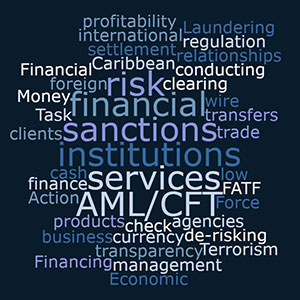 According to the Financial Action Task Force (FATF), de-risking is defined as “the phenomenon of financial institutions terminating or restricting business relationships with clients or categories of clients to avoid, rather than manage, risk”. The risk referred to in “de-risking” is a customer or client who could pose a higher than average risk of Money Laundering (ML) or Terrorism Financing (TF) or that processing transactions might result in a breach of sanctions regulation. De-risking can be caused by economic and regulatory concerns.
According to the Financial Action Task Force (FATF), de-risking is defined as “the phenomenon of financial institutions terminating or restricting business relationships with clients or categories of clients to avoid, rather than manage, risk”. The risk referred to in “de-risking” is a customer or client who could pose a higher than average risk of Money Laundering (ML) or Terrorism Financing (TF) or that processing transactions might result in a breach of sanctions regulation. De-risking can be caused by economic and regulatory concerns.
Economic concerns center around profitability, low risk appetite and excessive compliance cost. Regulatory concerns focus on perceived high risk; whether it is a country or a customer. It also deals with the possible breach of AML/CFT international/regional sanctions.
De-risking affects services and products, financial institutions and other agencies. The most severe effect of de-risking in the Caribbean has been the termination of correspondent banking relationships which includes check clearing and settlement, cash management services, international wire transfers, trade finance and conducting foreign currency denominated capital or current account transactions. The financial institutions, agencies and other entities affected by de-risking include money transfer operators and other remittance companies, small and medium domestic banks, small and medium exporters, retail customers, international business companies, e-gaming/gambling.
When de-risking occurs, it drives financial transactions underground to less regulated or unregulated channels. It creates financial exclusion and there is reduced transparency. These all lead to increased risk of AML/CFT.
